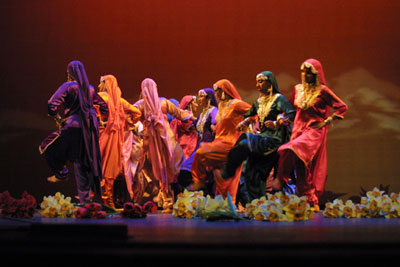 New Delhi:
New Delhi: The ancient tradition of Bhand Pather, a folk performance genre from Kashmir, is trying to find a slot in mainstream theatre, taking up new themes and adopting the repertory style of rendition.
The millennia-old performance genre is practised usually by Shaivite seers across the Valley in open spaces, especially on the way to Amarnath, where the sadhus or ascetics gather every year for the annual pilgrimage.
Bharatmuni's "Natyashashtra" says the Bhand Pather is a derivative of the word "Bhana" - a type of drama. It evolved as a combination of dance, drama, mime, music and puppetry into a total theatre, and was enriched in content by the medieval poets of Kashmir.
Bhand in Kashmiri means "play", while the "pather" is the performer.
The performers use the traditional "dholak" - a large wooden percussion instrument tuned with coir and hide - and the horn which resembles the Indian classical "shehnai". These instruments are rarely seen outside Kashmir.
A three-day festival of Bhand theatre, "Revisiting Bhand Pather", at the Indira Gandhi National Centre for Arts (IGNCA) directed by noted theatre personality of Kashmiri origin M.K. Raina, has brought to the capital a repertory ensemble of 23 artists to stage three plays, "Gosain Pather", "Shikargah Pather" and "Badshah Pather".
The festival is an attempt to make the tradition sustainable and compatible with new theatre movements to gain acceptance worldwide, said director M.K. Raina, who has been working with the actors in a village 80 km from Srinagar in a series of workshops.
The festival began Friday evening with Gosain Pather, a centuries-old play from the Bhand repertoire that explores "the concept of god's ultimate truth".
It brought to the audience the core of two faiths - Shaivism and Sufism - that shaped the spiritual growth of Kashmir for over 2,000 years, with the teachings of Nundrishi and sufi seer Lal Ded.
The play operates on many levels of consciousness, from physical to abstract, through a combination of humour, clowning and play-acting.
A spontaneous production without script, the plot revolves around a family of Brahmins. Three brothers, their father and a brood of Shaivite seers come into contact with visiting Sufi saints, including a woman mystic.
On Saturday, the repertory performed Shikargah Pather, a Bhand tradition that was revived after 30 years. Raina pointed out that despite being performed across centuries, the play was "revived".
The story of the kingdom of Pashupati - Lord Shiva - and its forest beings was told through the play, which also took on a contemporary problem - man-nature conflict.
On Sunday, the Bhand repertory is set to perform a Kashmiri adaptation of William Shakespeare's "King Lear", in which the king is compared to a Sufi mystic.
The story is narrated through the story of two fathers, Badshah and Bedar, and their sons. Badshah and Bedar, carried away by their scheming sons' lofty praises, discard the sons who are upright and honest. Later, repenting his ways, Badshah returns to his outcast son Rafiq, who dies in an attempt to save his father.
A shattered Badshah kills himself.
"When I first showed them (the performers) the script of Badshah Pather written by a Kashmiri professor, they threw away the script and sat with me for a month to devise the play," Raina said. The director narrated the story of King Lear to them.
The repertory has been staging the play for the last three years.
"They need space and money to survive. They have to become professional to carry on the tradition. Several Bhand artistes have left their vocation in the last decade in favour of alternative livelihhods for want of patronage," Raina said.
Raina believes that the Bhand artistes speak a universal language. He believes that the traditional performers need to go abroad, and gain global recognition. He is now trying to send the troupe abroad.
 New Delhi: The ancient tradition of Bhand Pather, a folk performance genre from Kashmir, is trying to find a slot in mainstream theatre, taking up new themes and adopting the repertory style of rendition.
New Delhi: The ancient tradition of Bhand Pather, a folk performance genre from Kashmir, is trying to find a slot in mainstream theatre, taking up new themes and adopting the repertory style of rendition.